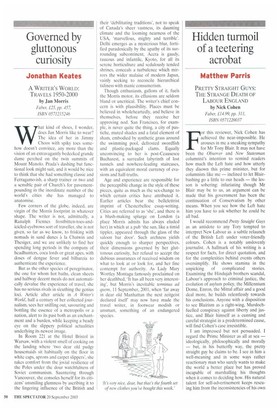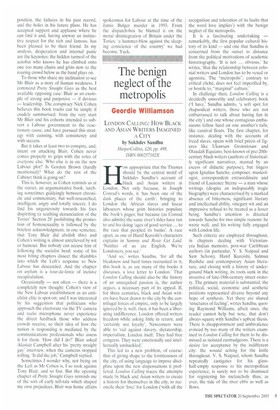Hidden turmoil of a teetering acrobat
Matthew Parris
PRETTY STRAIGHT GUYS: THE STRANGE DEATH OF LABOUR ENGLAND by Nick Cohen Faber, £14.99, pp. 311, ISBN 057122003 7 For this reviewer, Nick Cohen has achieved the near-impossible. He arouses in me a sneaking sympathy for Mr Tony Blair. It may not have been the Observer and New Statesman columnist's intention to remind readers how much the Left hate and how utterly they disown this prime minister, but for columnists like me — inclined to let Blairbashing go a little to our heads — the lesson is sobering: infuriating though Mr Blair may be to us, an argument can be made that his government has been the continuation of Conservatism by other means. When you see how the Left hate him you have to ask whether he could he all bad.
I would recommend Pretty Straight Guys as an antidote to any Tory tempted to interpret New Labour as a subtle relaunch of the British Left under voter-friendly colours. Cohen is a notably unslovenly journalist. A hallmark of his writing is a respect for facts, for direct quotation, and for the complexities behind events others oversimplify. He shows stamina in the unpicking of complicated stories. Examining the Hindujah brothers scandal, Labour's approach to criminal justice, the evolution of asylum policy, the Millennium Dome, Enron, the Mittal affair and a good deal more, he builds relentlessly towards his conclusions. Anyone with a disposition to see Blairism as a right-wing, Murdochfuelled conspiracy against liberty and justice, and Blair himself as a cunning and careful strategist in a predetermined cause, will find Cohen's case irresistible.
I am impressed but not persuaded. I regard the Prime Minister as all at sea — ideologically, philosophically and morally — but, in his butterfly way, the pretty straight guy he claims to be. I see in him a well-meaning and in some ways rather reactionary man who surely wants to make the world a better place but has proved incapable of marshalling his thoughts when it comes to deciding how. His natural talent for self-advertisement keeps rescuing him from the inconsistencies of his own position, the failures in his past record, and the holes in his future plans. He has accepted support and applause where he can find it and, having anyway an instinctive respect for the rich and famous, has been pleased to be their friend. In my analysis, desperation and internal panic are the keynotes: the hidden turmoil of the acrobat who knows he has climbed onto one too many chairs and grins now to the roaring crowd below as the band plays on. To those who share my inclination to see Mr Blair as a story of human weakness, I commend Pretty Straight Guys as the best available opposing case: Blair as an example of strong and purposive — if devious — leadership. The conspiracy Nick Cohen believes this book tracks can be simply if crudely summarised: from the very start Mr Blair and his cohorts intended to subvert a Labour government to the reactionary cause, and have pursued this strategy with cunning, with consistency and with success.
But it takes at least two to conspire, and, intent on attacking Blair, Cohen never comes properly to grips with the roles of everyone else. Who else is in on the new Labour plot? Is Gordon Brown (hardly mentioned)? What do the rest of the Cabinet think is going on? This is, however, as Cohen reminds us at the outset, an argumentative book, lurching sometimes giddyingly between chronicle and commentary, but well-researched, intelligent, angry and totally sincere. I do find his ungenerosity towards his foes dispiriting (a scathing denunciation of the Tories' Section 28' prohibiting the promotion of homosexuality is followed by the briefest acknowledgment, in one sentence, that Tony Blair did abolish this) and Cohen's writing is almost unrelieved by wit or humour. But nobody can accuse him of following the socialist herd: some of his most biting chapters dissect the shambles into which the Left's response to New Labour has descended. And the chapter on asylum is a tour-de-force of incisive recapitulation. Occasionally — not often — there is a completely new thought: Cohen's view of the New Labour establishment as an antielitist elite is spot-on; and I was interested by his suggestion that politicians who approach the electorate via the TV camera and radio microphone never experience the direct feedback those who address crowds receive, so their idea of how the nation is responding is mediated by the communications professionals who assess it for them. 'How did I do?' Blair asked Alastair Campbell after his 'pretty straight guy' interview, when the cameras stopped rolling. 'It did the job,' Campbell replied. Sometimes I wonder why, not being on the Left as Mr Cohen is, I so took against Tony Blair, and so fast. But the opening chapter of Pretty Straight Guys reminds me of the sort of early tell-tale which shaped my own prejudices. Blair was home affairs spokesman for Labour at the time of the Jamie Bulger murder in 1993. From the dispatch-box he blamed it on the moral disintegration of Britain under the Tories: 'a hammer-blow against the sleeping conscience of the country' we had become. Yuck.



















































































 Previous page
Previous page